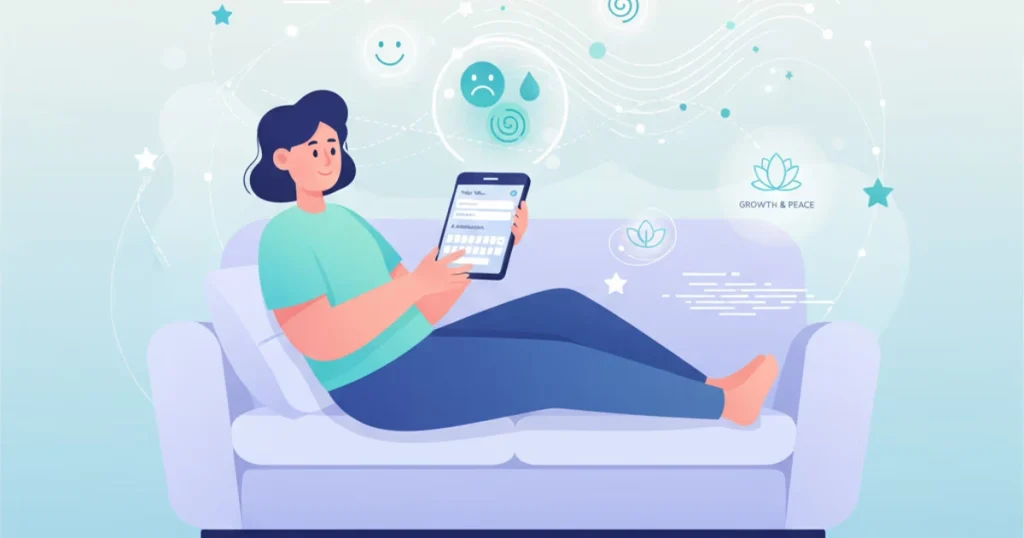Introduction
For generations, people have picked up a notebook when their thoughts felt too heavy. A line here, a late-night scrawl there, and suddenly the weight doesn’t feel quite as much.
The hard part has always been sticking with it. Most of us start strong, then miss a few days and the habit slides. Some nights you sit staring at the page not sure what to write. Other days you catch yourself thinking, “Does this even matter?”
That’s where tech quietly helps. Not to replace the pen or the feelings, but to make it easier to keep the habit alive. An emotional health journal app like TinyBit AI takes the messiness of quick notes, emojis, or even a short voice clip and gives something back. A reminder here, a little pattern there, or a gentle nudge to check in again tomorrow.
Why Daily Journaling Still Matters
At its core, journaling hasn’t changed: it’s about awareness. That pause. That moment you realize what you’re actually feeling. Thoughts become words, words become clearer, and suddenly you can see them from a bit of distance.
Over time, tiny notes turn into a personal map. You notice which situations drain you, which lift you, and which repeat week after week. Patterns that were invisible start showing up. That’s why people keep coming back to it, it’s not the writing itself, it’s the seeing
From Paper to AI Companions
That’s the difference with an emotional health journal app, even the tiniest entry gets noticed, and over time, those dots start to connect. One emoji, a quick “ugh” typed at 11pm, it still gets logged. And if it happens again and again, the app notices.
That’s where TinyBit comes in. Instead of just storing the entry, it reflects it back. If you keep saying “exhausted,” it nudges: “Maybe check your sleep this week?” It’s not dramatic, just enough to make you pause. Like a quiet companion pointing out what you might’ve missed.
Making the Habit Doable
The real struggle? Consistency. Miss three days and you feel like you’ve failed. Tools like TinyBit lower the bar. A single tap counts. One word counts. That’s how the habit survives.
For parents, this can be even more powerful. A mom might jot “angry after school” for her kid. Alone, those notes look random. But with AI, a pattern pops up: it happens mostly on heavy homework days. Suddenly the pieces connect, and the parent has something real to act on.
From Feelings to Gentle Guidance
A lot of people ask, “I’ve written it down, now what?” This is where AI can offer a little direction. Write “stressed,” and it suggests a short breathing exercise. Log “lonely,” and it shares a reflection or a quick guided meditation. If frustration repeats, it highlights the pattern and offers small tweaks.
TinyBit builds on this with short affirmations and personalized routines. Nothing over the top, just small nudges that keep the journal from becoming a dumping ground and turn it into a tool for growth.
Linking Mood and Health
Another step forward is connecting emotions with broader health. A string of “low energy” entries might mean fatigue, but paired with sleep data, it could suggest a pattern worth noticing. AI isn’t there to diagnose, it’s there to shine a light so you can decide what to do with it.
That’s when journaling stops being only emotional housekeeping and becomes part of overall well-being.
What People Actually Gain
So what’s the payoff for keeping up with it?
- Clearer thinking. You scribble it down, and somehow the thoughts aren’t bouncing around in your head so much. They just… settle, a little.
- Resilience. If you notice it creeping in early, stress doesn’t hit you all at once. It’s easier to deal with, bit by bit, day by day.
- Better conversations. Notes help you explain feelings to friends, family, or doctors.
- Consistency. Apps like TinyBit make small, regular check-ins possible.
It’s not about writing perfectly. It’s about showing up in small, real ways
A Simple Scenario
Take Ethan, a young professional. He often noted “irritable evenings.” The app connected it mostly to skipped lunches. That one link got him to pay more attention to eating on time. He didn’t fix everything overnight, but dinners at home felt lighter once he stopped missing meals.
If he hadn’t written it down, that link might have slipped past him. What felt small at first later turned out to shape his daily routine in a bigger way.
Closing Thought
Keeping a journal doesn’t have to be polished, sometimes one word, a rough note, or even a short voice memo is more than enough. What’s changing now is how tools like TinyBit, an emotional health journal app, supports the practice. It keeps journaling humans but removes some of the friction, so the habit actually sticks.
Some days it’s just a buzz on your phone reminding you to breathe. Other days it points out a habit you didn’t see. Either way, it makes awareness a little easier to carry into real life.
If you’ve started journaling before and then just stopped, TinyBit could be the small nudge that actually gets you back at it.




